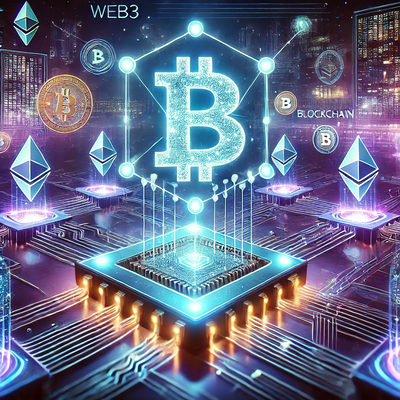Web3 Explained: The Future of the Internet & Why It Matters
The internet is evolving. We've moved from Web1, a static information-sharing network, to Web2, a highly interactive but centralized ecosystem dominated by big tech. Now, we’re stepping into Web3—a decentralized, blockchain-powered version of the internet where users have greater control over their data, identities, and transactions.
But how does Web3 actually work, and why is it important? Let’s break it down with simple analogies and explore how adopting it could reshape industries, finance, and online experiences.
What is Web3?
Imagine the internet as a city:
Web1 is like a library—you can read and access information, but you can’t interact with it much.
Web2 is like a shopping mall—you can browse, interact, and buy things, but everything is owned by big corporations (Google, Facebook, Amazon, etc.). They track your activity, own your data, and decide the rules.
Web3 is like a decentralized marketplace—users own their stores, control their identities, and operate without relying on a central authority. Everything is run transparently on blockchain, and no single company can shut it down or take control.
In Web3, instead of relying on companies to manage our data, we use blockchains, smart contracts, and decentralized applications (dApps) to interact and transact peer-to-peer (P2P). This means no middlemen, more security, and full user control.
How Web3 Works: Blockchain & Smart Contracts 🔗 Blockchain: The Digital Ledger
Think of blockchain like a public notebook that everyone can see but no one can secretly alter. Each transaction or action is recorded in blocks, linked together, and stored across thousands of computers (nodes). This makes Web3 transparent, secure, and nearly impossible to hack.
🔹 Analogy: Imagine a Google Doc that anyone can view, but no single person can erase past changes or own the document outright. It’s always available, tamper-proof, and verified by a network of users instead of a single server.
🤖 Smart Contracts: The Automated Middleman
Smart contracts are self-executing agreements coded onto the blockchain. They run when specific conditions are met—without needing a third party.
🔹 Analogy: Imagine a vending machine. Instead of needing a cashier (middleman), you insert money, select an item, and the machine automatically delivers it. Smart contracts work the same way, automating trust and transactions.
For example, in Web3 finance (DeFi), a loan agreement could be a smart contract: If you deposit collateral, the contract instantly releases funds—no need for banks, paperwork, or approval delays.
Why Adopt Web3? The Benefits of a Decentralized Internet
✅ Ownership & Privacy – Users control their own data, identities, and assets instead of corporations selling them to advertisers. ✅ Security & Transparency – Transactions and contracts are verified by thousands of nodes, making them tamper-proof and open to all. ✅ No Middlemen – Web3 removes third parties (banks, brokers, big tech), reducing costs and improving efficiency. ✅ Financial Freedom – Cryptocurrencies and DeFi give global access to banking and investments without needing a traditional bank account. ✅ Censorship Resistance – No single entity can shut down Web3 applications, ensuring freedom of speech and transactions.
📌 Read More: How Blockchain Powers the Future of the Internet
Real-World Use Cases of Web3
🔹 Decentralized Finance (DeFi): Borrow, lend, and trade crypto without a bank. 🔹 NFTs & Digital Ownership: Own unique digital assets like art, music, and virtual real estate. 🔹 Decentralized Social Media: Platforms like Lens Protocol let users own their content and identities instead of corporations profiting from them. 🔹 Gaming & Metaverse: Play-to-earn games give players ownership of in-game assets and currency.
🚀 Web3 is not just a concept—it’s already changing industries.
📌 Read More: The Rise of Web3 and Its Impact on Finance
Final Thoughts: The Internet is Changing
Web3 represents a shift in power—from corporations to users. It’s a movement toward a fairer, more open digital world where individuals truly own their online presence, assets, and identities.
While still in its early stages, adopting Web3 today could give you a head start in the next big internet revolution.
💡 Are you ready for Web3? Stay updated with Crypto Alleys for more insights!
